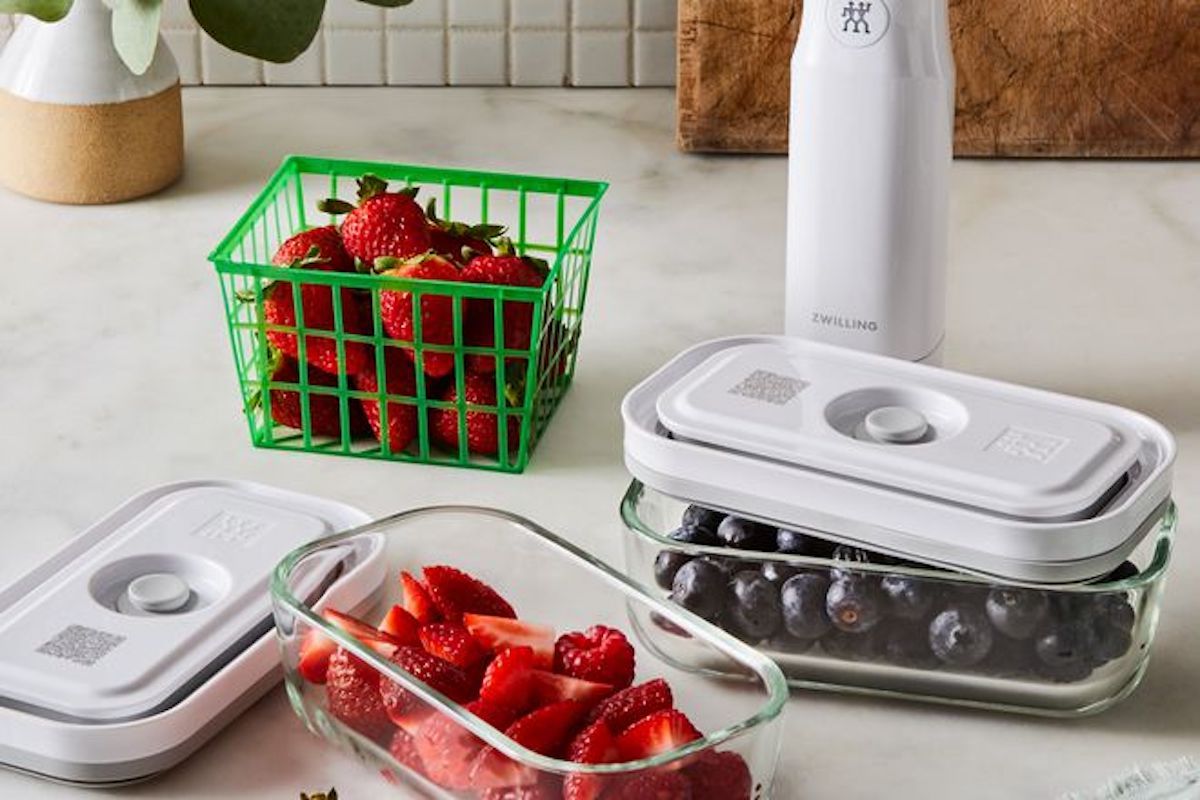Whether it's a big CSA delivery of seasonal produce or an overzealous haul from the weekend farmer's market, we've all been there. You find yourself with an abundance of beautiful produce, and not enough time to enjoy it all before it starts to lose freshness, or worse, begins to go bad. According to the USDA, food waste at the retail and consumer levels can be as high as 31%. You can control food waste in your own kitchen by learning what your produce needs to live its best, longest life, and by having the best produce storage containers on hand to help.
We tested a number of popular products, and narrowed down our favorites for storing all the fruits and vegetables in your kitchen.
Refrigerator storage
Produce and herbs kept in the refrigerator will all require different storage solutions, depending on their individual needs. Some benefit immensely from air circulation to maintain optimal freshness, while others should be kept airtight. Sometimes moisture needs to be whisked away, while others should be kept in water (like cut flowers).
When it comes to delicate fresh berries or soft leafy greens, the key to preventing food spoilage is keeping moisture at bay. I found the FreshWorks Produce Saver collection from Rubbermaid to be a well-designed solution. These containers come with a fitted tray inside to lift the produce from the bottom, and help keep moisture from accumulating around them. They also come with a vent filter in the lid that helps regulate the flow of oxygen and carbon dioxide, creating an ideal environment for longevity.
Some produce, especially items that have been cut, need airtight solutions like these Zwilling glass containers to keep them fresh and to prevent unwanted odors from assaulting your nose every time you open the refrigerator (we're looking at you, Brussels sprouts and cauliflower).
The life of fresh herbs and asparagus can be extended by storing them in a small amount of water. This Herb Savor Pod from Prepara is perfectly designed to fit right in the refrigerator door. There's an easy access filler cap where the water can be changed every three to five days. This not only triples the typical lifespan of fresh herbs, it also keeps them fresh and crisp. The hard shell window offers easy access when you need something fresh to liven a dish, but it also allows the herbs to breathe at optimum hydration levels. Plus, it protects the leaves from being crushed by other items in the fridge. As someone who has bought (and re-bought) delicate fresh dill more times than I can count, investing in this storage solution has ultimately cut down on the grocery bills.
Avocados can be a challenge. You keep them out on the countertop until they have reached that perfect, fleeting moment of ripeness. Then once you slice it open to enjoy, there's always that other half to save and enjoy later. All too often, of course, that beautiful shade of green will turn brown before you even get a chance. I've found that the Avocado Hugger works wonders. It fits perfectly snugly around a sliced avocado with the pit still attached, and keeps it fresh for up to two days—a relative impossibility using a traditional plastic container or plastic wrap. There are also Food Hugger solutions for cut lemons, onions, and bananas.
I have been searching for a solution for onion odors for years. There is nothing worse than trying to save the other half of an onion only for the pungent aroma to infiltrate all the other items in your refrigerator (particularly if you're a baker like me). I also like to get a head start on meal prep by chopping onions or garlic ahead of dinner time. Smelly Proof bags are a game-changer. I was able to prepare the entire mise en place for the next evening's dinner, and couldn't smell even the faintest whiff of onion when I opened the refrigerator the next day.
The bags are washable and reusable, but I would recommend labeling the outside of the bag and reusing it only for the same items. As much as these bags keep the odor out, the inside of the bag can retain remnants of what it contained (especially when it comes to more pungent ingredients).
Room temperature storage
Some produce is best kept out on the countertop at room temperature, in the pantry, or in other cool, dark place.
Bananas are the best example of a fruit that should be stored at room temperature to allow them to develop proper flavor and texture as they ripen. One of the most effective ways to lengthen the life of a banana bunch is to hang it from a banana stand (which is not a container, of course, but still the best product by far for storing them). By hanging bananas from a hook, the ethylene gas released from its stems works more slowly, ultimately ripening the bananas more evenly all the way around. I love this copper banana holder because it is just as chic-looking as it is effective.
Potatoes, onions, and sturdy root vegetables like rutabagas and turnips are best kept in a cool, dark place, like the back of your pantry. Breathable cotton vegetable storage bags are a great choice for "long haul" produce like these items. I like these bags from Eddingtons because they have a convenient "first-in, first-out" system. Simply fill from the drawstring opening at the top, then take what you need from the zipper opening at the bottom. The bags also have blackout linings to keep food fresher for longer.
In the end, I have found that it's certainly worth investing in a few clever, sturdy tools upfront in order to cut down on food waste later. All of these products were built to last for years, have found permanent spots in my kitchen, and will pay for themselves in no time.




Shares